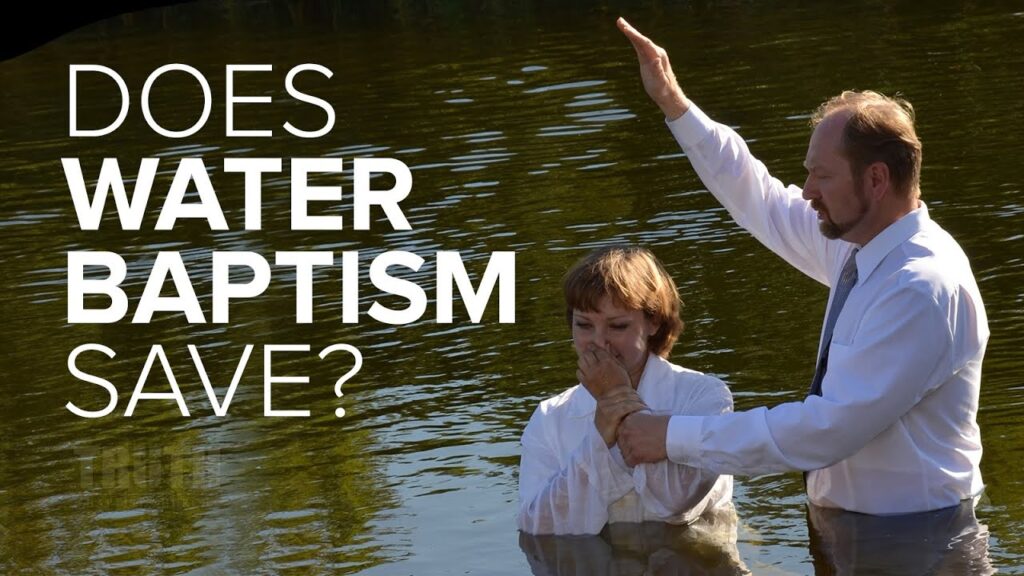
Saved by Grace Through Faith Alone

The Bible clearly teaches that salvation is by grace through faith, not by works. This is a fundamental doctrine that must be understood when considering the role of water baptism in the life of a believer.
Ephesians 2:8-9 (NASB): "For by grace you have been saved through faith; and that not of yourselves, it is the gift of God; not as a result of works, so that no one may boast."
Salvation is a gift from God that we receive through faith. It is not something we can earn by our actions, including water baptism.
Water Baptism: An Act of Obedience Following Salvation
Water baptism is an important act of obedience for a believer, but it follows salvation rather than causes it. Baptism is a public declaration of our faith in Jesus Christ and the salvation we have already received. It is the evidence that we are saved.
Acts 2:38 (NASB): "Peter said to them, 'Repent, and each of you be baptised in the name of Jesus Christ for the forgiveness of your sins; and you will receive the gift of the Holy Spirit.'"
While this verse includes baptism, it starts with repentance. Repentance and faith in Jesus are the key components of salvation. Baptism follows as a sign of the forgiveness and new life already received through faith.
Acts 2:41 (NASB): "So then, those who had received his word were baptised; and that day there were added about three thousand souls."
On the day of Pentecost, the people were saved by believing the gospel message. Their baptism followed their salvation as a public testimony of their faith, not as the means of their salvation.
Understanding Verses in Context
It is crucial to understand Bible verses in the context of the paragraph, chapter, and book to avoid forming incorrect conclusions and false doctrines. Cherry-picking verses can lead to misunderstanding and misapplication of Scripture.
2 Timothy 2:15 (NASB): "Be diligent to present yourself approved to God as a workman who does not need to be ashamed, accurately handling the word of truth."
Accurately handling the word of truth requires studying Scripture in context, understanding the surrounding verses, and the overall message of the Bible.
Baptism as a Symbol, Not a Saving Act
Romans 6:3-4 (NASB): "Or do you not know that all of us who have been baptised into Christ Jesus have been baptised into His death? Therefore we have been buried with Him through baptism into death, so that as Christ was raised from the dead through the glory of the Father, so we too might walk in newness of life."
This passage shows that baptism symbolises our identification with Christ’s death, burial, and resurrection. It does not create this identification; it publicly declares it.
1 Peter 3:21 (NASB): "Corresponding to that, baptism now saves you—not the removal of dirt from the flesh, but an appeal to God for a good conscience—through the resurrection of Jesus Christ."
Peter clarifies that it is not the physical act of washing with water that saves, but what it represents—an appeal to God for a good conscience made possible through the resurrection of Jesus. It symbolises the believer’s faith and new life in Christ.
Addressing Apparent Contradictions
Some scriptures seem to suggest that baptism is necessary for salvation, such as Mark 16:16:
Mark 16:16 (NASB): "He who has believed and has been baptised shall be saved; but he who has disbelieved shall be condemned."
This verse highlights the importance of both belief and baptism. However, notice that condemnation is linked to disbelief, not the absence of baptism. The primary requirement for salvation is faith in Jesus Christ.
Titus 3:5 (NASB): "He saved us, not on the basis of deeds which we have done in righteousness, but according to His mercy, by the washing of regeneration and renewing by the Holy Spirit."
This reinforces that our salvation is not based on righteous acts we have done but on God’s mercy. The “washing of regeneration” refers to the inner transformation by the Holy Spirit, not the external act of water baptism.
What Sin Does Water Baptism Address?

Water baptism does not save us from the penalty of Adam’s sin; only faith in Jesus Christ does that.
Romans 5:12 (NASB): "Therefore, just as through one man sin entered into the world, and death through sin, and so death spread to all men, because all sinned."
Only Jesus’ sacrifice on the cross can atone for the original sin. Water baptism symbolises our new life in Christ and our commitment to live according to His will. It represents our cleansing from personal sins as a testimony of our faith.
Colossians 2:12 (NASB): "having been buried with Him in baptism, in which you were also raised up with Him through faith in the working of God, who raised Him from the dead."
This passage underscores that baptism symbolises our burial and resurrection with Christ, achieved through faith in God’s power, not the act itself.
Conclusion: Evidence, Not Cause
Water baptism is evidence of our salvation, not the cause. It is a public declaration that we have already been saved by grace through faith in Christ alone.
Galatians 3:26-27 (NASB): "For you are all sons of God through faith in Christ Jesus. For all of you who were baptized into Christ have clothed yourselves with Christ."
We are sons and daughters of God through faith in Jesus. Baptism is a symbolic act that follows our faith, signifying that we have “clothed” ourselves with Christ.
Summary
- Salvation is by grace through faith alone (Ephesians 2:8-9; Titus 3:5).
- Water baptism is a response to salvation, not the cause (Romans 6:3-4; 1 Peter 3:21).
- Baptism symbolises our identification with Christ (Colossians 2:12).
- Condemnation is linked to disbelief, not the absence of baptism (Mark 16:16).
- Baptism is an act of obedience and a public declaration of the faith and new life we have already received in Christ (Galatians 3:26-27).
By understanding these truths, we see that water baptism is an important step of obedience that follows our salvation, serving as a powerful testimony to others of our faith in Jesus Christ.
